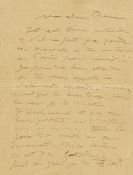
Arno Holz
Rastenburg
1863 -
Berlin
1929
Arno Holz; born April 26, 1863, in Rastenberg, East Prussia; died October 26, 1929, in Berlin. Arno Holz was a poet and dramatist of German Naturalism. In 1888 in his programmatic work "Die Kunst, ihr Wesen und ihre Gesetze" ("Art: Its Essence and Laws"), he began developing his theory of a "consistent Naturalism."
His version of Naturalism had the goal of an exact portrayal of setting and environment by inclusion and elements of colloquial language. This theory finds its expression in the formula "Art = Nature - X," meaning that art should correspond to nature as closely as possible, whereby the task of the artist is to keep X as small as possible.
This theoretically postulated "consistent Naturalism" finds its practical application in the works "Papa Hamlet" and "Die Familie Selicke," which appeared under the pseudonym Bjarne P. Holmsen. The demand that art should be an exact representation of reality led Arno Holz to a new, experimental mode of expression, the so-called "Sekundenstil," with which social misery is described by the second. The linguistically virtuosic poetry volume "Phantasus," which appeared in 1898, is considered his main literary work.
In his poetry, Arno Holz experimented with a rhymeless style, where he moved away from the traditional rules of form. According to his programmatic piece, "Revolution der Lyrik" ("Revolution of Poetry"), a work, free from rhyme and measure, should be identified by its "inner rhythm." A formal peculiarity of the poems in "Phantasus" is the centered printing of each verse on an imaginary axis, by which this style received the name "Mittelachsenlyrik" ("middle axis poetry").
In 1903, Holz wrote the Baroque oriented "Lieder auf einer alten Laute" ("Songs on an Old Lute"), which was later expanded as "Dafnis" and published by Reinhard Piper. This became one of Holz' few financial successes.
Would you like to sell a work by Arno Holz?
Infos for seller


